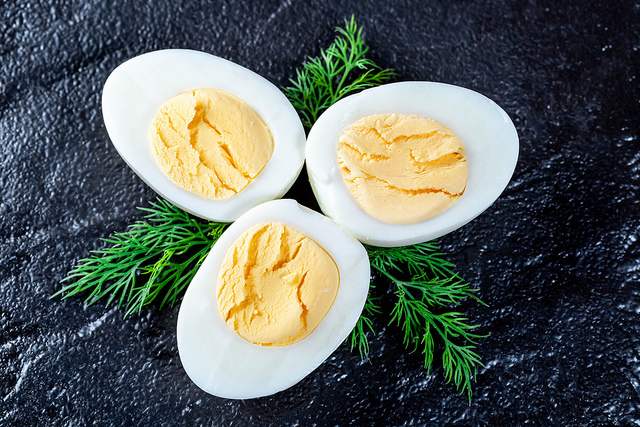In this article we tried to provide enough quality information about the chicken eggs, whether they are healthy to eat, or not?! What are their benefits on the one hand and could their consumption have any side effects upon our health as well?
Firstly, when it comes down to the chicken’s life span unfortunately most of the chickens have a short lifetime because they are usually killed for their meat. While some kill them for selling their meat, others decide on keeping them for laying eggs.
Furthermore, it seems like there are many discussions and debates among the people, whether to consume a chicken egg, to raise its consumption or lower it to the minimum?

However, while getting ready to write the article, we came across different views and opinions. One is to conclude: All people use or don’t use eggs in their feed for different reasons.
Therefore, it means that no universal response whether chicken eggs are healthy or not really exist?
That is why we think that you should know more about the chicken eggs because they appear to be very frequent component in many diets and different types of nutrition.
So, after the next rows of writing make sure on their true value.
Certainly, the most important thing is buying a fresh egg. But the question is what a fresh egg is and how to know is it fresh indeed? The clue is in its white.
On the other hand, buying a fresh egg is certainly not the only thing you are interested into.
Additionally, go through the next 35 amazing facts about chicken eggs that we prepared just for you!
- A normal fresh egg has a yellow yolk, a layer of thick albumen (egg white) surrounding the yolk, and a thinner layer of albumen surrounding that.
- Every egg yolk has a white disc called a blastoderm. It is usually visible but may be very pale.
- In an infertile egg, the blastoderm is solid white. In a fertile egg, the disc has a faint or distinct ring that makes it look like a donut or bulls-eye.
- Fertile eggs are completely edible. In fact, some people consider fertile eggs more nutritious than infertile eggs, but scientific research does not confirm this.
- Fresh fertile eggs collected daily will not have embryos in them. Embryos do not begin to develop unless the eggs are in a favorable warm environment under a broody hen or in an artificial incubator.
- The yolk of a chicken egg may be any shade from pale yellow to orange, depending on what the hen has eaten before. The color is usually consistent if hens are fed only one type of feed, but foraging hens and those fed kitchen scraps will often produce a variety of yolk colors.
- Eggs have natural benefits upon or health. Eggs have been regarded a complete source of protein as they contain all nine essential amino acids, the ones we can’t synthesize in our bodies and must obtain from our diet.
- Eggs are rich sources of selenium, vitamin D, B6, B12 and minerals such as: zinc, iron and copper.
- Egg yolks contain more calories and fat than the whites. They are a source of fat soluble vitamins A, D, E and K and lecithin.
- One medium egg (boiled) contains: 84 calories, 8,3g protein, 5,7g.fat and 1,6gsat fat.
- The brown eggs are usually bigger than the white ones.
- The chicken egg can protect our bones, preventing osteoporosis
- Chickens are beneficial during pregnancy and breast feeding for normal brain development.
- Blood and meat spots in an egg are caused by a rupturing blood vessel when the egg is formed. This happens in less than one percent of all eggs.
- The egg shell can appear in different colors. It depends on the feed and breed. The color of the chicken feathers and earlobes can tell the color of the egg shells. The purpose of an egg shell is to protect everything inside.
- Red chicken with red ear lobes will lay brown eggs, while with white ear lobes, white eggs.
- Some chicken breeds lay green or teal eggs???
- The production of chicken eggs has become a global industry. Due to the enormous number of egg use in cookery, there are many farms that raise chickens solely for eggs.
- In order to safely serve the chicken eggs, ensure first that they have been heated at the temperature of 160 degree F, or 71 degree C.
- Only one of every 20.000 eggs might contain bacteria. The possibility to find an egg with salmonella is so rare like 0.005%.
- A hen turns her egg nearly 50 times daily.
- The Easter Egger Chickens lay naturally colorful eggs (i.e pink, blue, green and brown eggs).
- The word ‘yolk’ has derived from Old English, meaning’ yellow’.
- Number of eggs produced in the USA per year is 6,6 billion dozen.
- One large-sized egg contains 186 mg of cholesterol.
- A cloudy egg white means a fresh egg
- A clear egg white means an aging egg.
- Eggs raise HDL, also known as good cholesterol. That is one way to protect yourselves from any heart disease)
- An egg contains more than 100 mg of choline, which is very important nutrient that protects our brains.
- Eggs contain lutein and zeaxanthin, which keep our eyes in a good form. In addition, regular and proper egg consumption may reduce common eye disorders such as: cataracts and macular degeneration.
- Eggs are most frequently used for weight loss.
- Eggs are the second most common food allergy in young children. As a result little children below 2 years age old aren’t usually recommended to consume eggs by the doctors.
- Vegans avoid consuming eggs.
- Eggs serve several purposes in baking: binding, leavening, moisture, flavor and appearance.
- Chicken eggs were found to have a compressive strength of 100 lbs.
Summary
After these facts we really believe that you won’t doubt the chicken eggs value anymore.
However, you can yet choose between consuming them or not. It is up to an individual view.
Our aim was to put all these educational facts in the article, thus raise the awareness among the people that eggs are healthy and nutritious components, thus can’t expose us to any health issue if used properly and in normal amounts. On contrary, they can help against many disorders as stated above.

For those who unfortunately suffer from some genetic disorder, high cholesterol or diabetes, the consumption of eggs is not forbidden. It just has to be regulated by your personal doctor.
Finally, people, especially children who are allergic to eggs become tolerant over time. Unfortunately, it is true that some remain allergic their entire lives. In such cases, they can find suitable replacement, for instance mashed banana is popular replacement for eggs.
Are chicken eggs healthy to eat? What do scientists and doctors say?
Through the following lines, you will encounter some scientific citations on benefits and possible side effects of consuming chicken eggs.
According to Dr. Santis eggs are an inexpensive source of high-quality protein that also happens to be a source of antioxidants, namely lutein and zeaxanthin, which benefit eye health as well.
In an effort to cut down on total calories and total fat, it’s not uncommon for health-conscious consumers to ditch the yellow yolks, D’Ambrosio says, and instead opt for just the egg whites.

Choline, D’Ambrosio explains, it is a nutrient for brain development. Pregnant and breastfeeding mothers need this nutrient in their diets to support the infant’s brain development. We mentioned this before as a fact, that eggs are really important for normal brain development.
The yolk also contains half of the total protein, as well as other vitamins and minerals, like folate, choline, vitamin A, riboflavin, iron, calcium, phosphorus, potassium and healthy fatty acids.
However, beside al the positive facts and things mentioned above, perhaps the biggest debate appears in the cholesterol content of the eggs.
Much of the research concluded that foods high in cholesterol (like eggs) will increase your blood cholesterol. Therefore, it is true that eggs are high in cholesterol, but it doesn’t necessarily mean they raise the blood cholesterol. The liver on the other hand, produces larger amounts of cholesterol every day.
Moreover, the earl research had shown, that foods examined were not only high in cholesterol, but also high in saturated fat (like butter and fatty meats), as well as trans fats (like man-made, partially hydrogenated oils).
“Therefore, newer research has concluded that the saturated and trans fats are actually the main culprits for increasing blood cholesterol,” D’Ambrosio points out. “
Those without high cholesterol, diabetes or a history of heart disease can eat an average of one egg a day without increasing blood cholesterol or risk of cardiovascular disease, D’Ambrosio says. When used properly, meaning not in large amounts, eggs protect our heart indeed.
Another study out of the University of Sydney also found that eggs were not linked to cardiovascular risk. Researchers concluded that eating up to 12 eggs per week for a year did not increase one’s risk of cardiovascular disease in people with pre-diabetes and type 2 diabetes specifically.
Summary
Nevertheless, the response to eating eggs varies between individuals. Once again it is up to you to decide whether they are healthy to eat? We honestly hope that you will bring the right decision.
However, bear in mind this article including the 35 amazing facts about the chicken eggs plus don’t forget that eggs contribute to the overall structure, color, flavor and consistency of merely all baked goods that we consume on daily basis.


